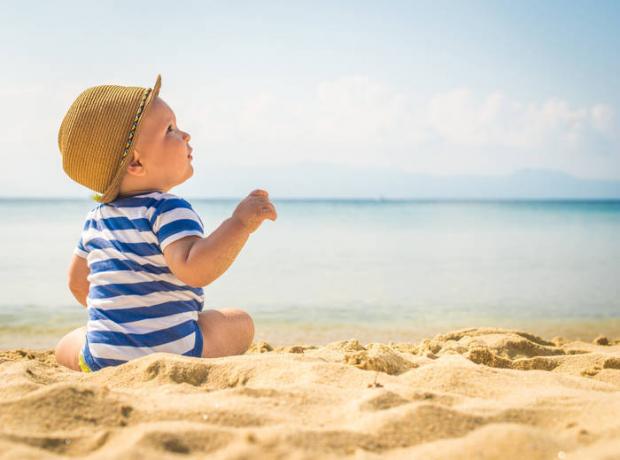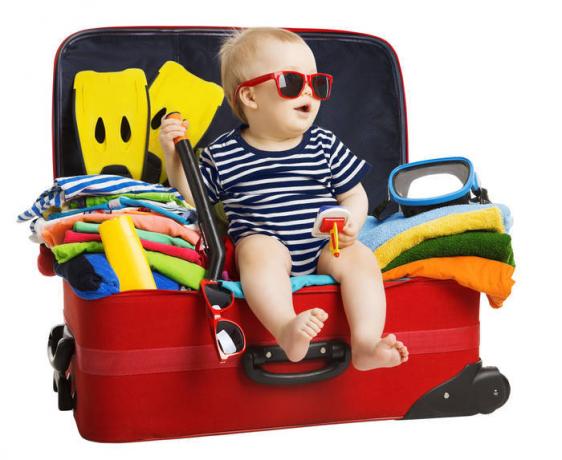Rest abroad interested in children and adults. But do not forget that there is another and the climate, and disease are not like us. The existence of some of these mothers sometimes do not even know ...
Warm sun and gentle sea dulls vigilance. Everything looks so beautiful that I can not believe the bad. You let your baby splash on the edge of the surf. And you know what the surf with a microbiological point of view? Constantly whippable "cocktail" of pathogens, listed in the medical guide takes one and a half pages. There are rare and microbes, and widespread. A mouth-then opened the crumbs, and water lapped easily gets there!
Danger at sea
1. This baby bathing can threaten the so-called intestinal infection of unknown etiology (Quinet) nausea, vomiting, fever and perspective hospitalization. Or amoebic dysentery - amebiasis.

Rest abroad with the child: how to protect your baby from illness / istockphoto.com
It is characterized by abdominal pain and diarrhea mixed with blood, in young children, severe complications up to the formation of an abscess - a purulent focus in the brain or the liver.
2. Another danger lies in wait for your crumbs in the water, especially the sea - hepatitis A, colloquially referred to as jaundice. Intrigue of this disease is that it will manifest itself immediately, but after a few weeks after infection. If the baby had swallowed some water infected in July, in August and September, he runs the risk of laid up in bed!
To prevent hepatitis A and other enteric infections, swim with the baby where deeper to Vodicka reached crumbs at least from the waist up. Here, the epidemiological situation is much more favorable - the water sample is much cleaner.
The most reliable protection against hepatitis A vaccine. It is not among the mandatory, but pediatricians strongly advised to abandon it. Typically, vaccination against this disease is carried baby still in the hospital, was repeated a month, and revaccinated every six months.
But if your pipsqueak, for whatever reasons, are not vaccinated, it must be vaccinated in the past month and a half before a trip to the seaside resort, or in the country that are not on this disease. On the production of children's immunity the body needs at least four weeks.

Rest abroad with the child: how to protect your baby from illness / istockphoto.com
Vaccinated children from the disease in two stages, but even the first dose is sufficient to develop within a month enough immunity to protect against infection for at least six months. And if you bring the vaccination until the end, to protect the crumbs will suffice for at least five years.
Tsikarii and the sad consequences
Not only in Asia, Africa and Latin America, but in Europe it is found the so-called foci schistosomiasisWhich, according to estimates of the World Health Organization, every year manage to recover hundreds of thousands of children. It's enough to enter into any fresh water body with standing water where ducks, geese, swans, live freshwater snails. Both are intermediate hosts of parasites specific - shistosomatid that can penetrate into the skin. When this happens, the baby feels a slight tingling sensation, but in those places where the larvae entered (they are no longer a millimeter in size and have a special name - cercariae), there are small red dots.
- Half an hour after the introduction of cercariae affected area begin to swell and itch stronger. After the larvae are injected into the skin of the poison that causes an inflammatory response. Sami cercariae die quickly in the human body, but the suffering of the baby on it do not stop. In the next few hours on the site of bites swell tight pink bumps the size of a pea, over time, turn into pustules. Or appear the spots with red dots on the site where the blisters occur soon. Affected areas itching and burning, the body temperature rises crumbs.
- In order to facilitate the child's condition, the doctor will prescribe him receiving antihistamines and antipyretics.
- The task of parents - not to allow the baby to comb the rash. If we follow the crumbs difficult to put on his gloves handles: they at least he would not have to scratch the skin.
- To reduce itching at the crumbs are applied to the sore area with clean linen cloth soaked in cold water, powder powder itchy places.
- Inflammation withdraw products from the child's body will help to drink plenty: poite child as often as possible.
- Renew bathing (no standing water!) As possible after complete recovery, when the skin does not remain blisters and scabs.

Rest abroad with the child: how to protect your baby from illness / istockphoto.com
Grits and leeches
Kids who are just starting to crawl and walk, the water usually is stripped completely. A crumb're not forced to sit on her mother spread out a clean beach towel. He runs on the river bank and spanked bare ass right on the sand or on the grass. And then the children's gynecologist diagnosed in babies vulvovaginitis, caused by dirt and sand particles, got on the vaginal mucosa.
- Sometimes, after a holiday in freshwater bodies in intimate places kids are sucking leeches, causing hirudiniasis. Highlighting hirudin, which prevents blood clotting and histamine substance, expand capillaries, leeches cause bleeding at the site of suction. And this is a direct way to anemia.
- Consult your doctor. Typically bloodsucking was removed with an alcohol and a strong salt solution, but even operation may be required in some cases.
- The beach is not the crumbs undress completely: leave her panties.
Mosquitoes carry malaria
The most dangerous and widespread parasitic disease - malaria, which is known to be transmitted by mosquitoes. Its natural foci have in the Azores, Madeira, Israel, Thailand, Vietnam, China, India and many other countries.
- The first attack usually develops within 9-15 days after infection, but sometimes it takes place one year after the bite: the baby fever, sweats, possible vomiting.
- Wherever you went with the crumbs, be sure to bring your repellent. Damage to the skin and clothing, it reliably repels mosquitoes.
- By purchasing a ticket to the tropics with humid climate, ask the hotel if treatment is carried out against the insects. Be careful: the babies are at risk of malaria incidence.

Rest abroad with the child: how to protect your baby from illness / istockphoto.com
Reliable protection
- It is unlikely that someone will go with the baby to exotic countries, where raging cholera or typhoid. However, unpleasant surprises can be fraught journey and epidemiological safety in the regions, if the child has not been immunized against measles, diphtheria, tetanus, rubella, mumps, polio.
- Refrain from trips abroad with a baby under the age of six months, especially in exotic countries.
- Take care of the measles vaccination. Typically, such vaccines are given in a year, but the kiddies from 6 to 11 months, whose parents are trafficked abroad, the vaccine is administered early, up to 28 days before departure.
Also you will be interested to read this: Family Travel: 7 Secrets for thrifty parents

